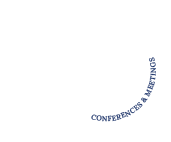Special Sessions
Special Sessions
See the descriptions for all Special Sessions
SS01. Advanced signal and image processing techniques for condition monitoring of Electric Machines and Drives
SS02. Data-driven fault diagnosis and fault-tolerant control for industrial systems
SS03. Learning-Based Energy Management for Sustainable Energy Systems
SS04. Smart Sensors, Sensor Networks, and Standards for IoT Applications
SS05. Advances in Electrical Energy Systems: Markets, Digitalization and IA in electrical grids with renewable energies
SS06. Integration of EV Charging Infrastructure and Renewable Energy Sources: Challenges and Opportunities
SS07. Advanced Multilevel Converters for Green Energy Integration: Topology, Modulation, Control Strategies, and Applications
SS08. Revolutionizing Electric Mobility: Advancements in Wide Bandgap Power Electronics for the Next Generation of EV Powertrains and Charging Infrastructure
SS09. Design, Control and Fault Detection of Power Converters for Energy Storage and EV Charging Systems
SS10. Advanced Network Automation in 5G and Beyond for Industry 5.0
SS11. Physics-Informed Learning for Modeling, Monitoring, and Control in Industrial Systems
SS12. Interoperability Frameworks for Smart Transducers in Intelligent Systems
SS13. Advanced Topologies and Control Strategies for DC-DC Power Converters
SS14. Grid-Integrated Electric Vehicle Charging Systems -Advancements in Microgrid and Power Distribution
SS15. Integration of Renewable Energy Sources for Fast, Superfast, and Ultra-Fast EV Charging Stations: A Sustainable Solution
SS16. Efficient and Reliable DC Protection Technologies
SS18. Recent Advances of Renewable Energy Utilization in Intelligent Power Distribution Systems
SS19. DC-DC Power Converters: Novel Topologies, Advanced Control and its applications in Electric Vehicles
SS20. Topology Design and Advanced Control Strategy of Hybrid Energy Storage System for Clean Distribution Network and Green Transportation
SS21. Next-Generation Powertrains for Electric Vehicles: High-Efficiency Machines, Intelligent Integration and Advanced Automated Control
SS22. Security Communication and Control of Distributed Networked Systems under Malicious Cyber-attacks
SS23. Battery Energy Storage Systems in Microgrids – Design, control, and reliability
SS24. High Power Hybrid and Electric Vehicles: Advances in Design, Operation and Charging
SS25. Future MVDC & LVDC Networks: Architecture, Topology, Control, Protection & Applications
SS27. Advanced Power Electronics and Control for Efficient Renewable Integration in Low-Carbon Microgrids
SS28. Advances in Energy Management for Sustainable Energy Systems
SS29. Advanced Control Techniques for Power Electronics Converters
SS30. Novel Developments for Special Robots and Vehicles in Complex Scenarios
SS32. AI-Driven Strategies for Power and Energy Systems Condition Monitoring: Advances in Fault Diagnosis, Prognosis, Predictive Maintenance, Cyberphysical Security, and Privacy
SS33. Advanced Motor Drive and Control for High-Performance Robotic Joints
SS34. Advancements in Power Electronics for Hydrogen Systems and Beyond
SS35. AI based Grid Integration of DERs and EVs
SS36. Advanced Technologies for Battery Management Systems
SS37. Advanced Modeling and Control of Grid-Connected Converters for Distributed Generation and Power Quality
SS39. Developing durable and reliable hydrogen and energy storage systems towards real-world applications
SS40. Advanced control and image processing technology for robots
SS41. Advanced Control and Optimization for Power Converter Systems in Electrified Transportation
SS42. Transforming the Energy Landscape with Hydrogen Based Solutions
SS43. Aerial Manipulation Systems in Dynamic Environments: Intelligent Modeling, Planning, and Control
SS44. Solar Photovoltaic Frontiers: Design, Deployment, Reliability, and Global Policies
SS45. Model-Based Control Techniques for Three-Phase Systems
SS46. AI-driven optimization, control and management for economical operation of renewable energy power systems
SS47. Data-based intelligent sensing and its application to system integration technology
SS48. Theory and Technologies on Human Factors in Advanced Human-System Environment
SS49. Advanced Technologies of Motion Control for Robotic Applications
SS50. Advanced Applications and Topics in Model Predictive Control In Microgrids, Drives, Converters and Renewable Energy
SS51. Innovation in Power Electronics and Intelligent Energy Systems for Sustainable Industrial Transformation
SS52. Advanced Control and its Application in Complex Industrial Systems
SS53. Multiphase technology – a solution for high-performance electric drives
SS54. Power converters and control for electric vehicle charging infrastructure
SS55. The Responsible Practice of Generative Artificial Intelligence for Industrial Applications and Systems
SS56. Cyber Physical Security in Microgrid
SS57. Smart Measurements and Intelligent Control for Self-Consuming Smart Homes and Microgrids
SS58. Modular Power Electronic Converters: Modelling, Design, Control, and Applications
SS59. Sustainable electrification technologies for buildings and communities
SS60. Grid Connected Power Electronics for Advanced Functionalities: Converter Design, Topologies, Modulation Techniques, and Control Techniques
SS61. Key Reliability Considerations and Advancements in Solid-State Transformers
Call for Special Sessions
Special Sessions (SSs) provide the opportunity to focus on emerging topics, which are not reflected in the list of conference main technical tracks or represent a specific working field. SSs focused on reporting innovations and breakthroughs in highly specialized topic areas (within the conference’s scope) will be organized. Professionals in the areas of industrial electronics are invited to propose SSs to be held at IECON 2025.
IECON 2025 is organized into “IECON Green Tech”, “IECON ICT & AI in Industry”, and “IECON Integration, Control & Robotics”, and SSs will follow the same structure to reach the appropriate audiences.
Prospective organizers must submit to the respective chairs the following information using the corresponding template.
- Title and subject of the SS.
- Name(s), email(s), and affiliation(s) of the organizers. Multi-nationals preferred and multi-institutional mandatory.
- Brief description (no more of 200 words) of the contents, highlighting the innovative aspects of the proposal and its relevance for IECON audience.
- Short bio(s) and picture(s) of the proposer(s), including the contributions (e.g., publications or previous SS experience) related to the topic of the SS.
- A list of potential authors and affiliations (at least 10). Multi-nationals and multi-institutional mandatory.
- A list of potential reviewers and affiliations (at least 20). Multi-nationals and multi-institutional mandatory.
Once an SS is approved, organizers must publicize it among researchers and practitioners in the field and attract sufficient number of papers. Papers submitted to SSs will undergo the same review process as regular papers. Organizers are responsible for managing the review process, assuring at least three quality reviews per paper. This includes selection of reviewers from their peers.
Conference Registration: At least one organizer of the SS is expected to register for and attend the conference, as well as chair the corresponding session(s). One complimentary full registration will be provided to successful SSs with at least 6 papers not authored by any of the organizers.
Conflict of Interest: Before starting the review process, SS organizers must explicitly declare papers which present a conflict of interest for them. A conflict of interest arises where the judgement of a paper quality can be influenced by the organizers being authors or knowing some of the authors. To ensure independent reviews, this conflict must be marked as such in the submission system and the SS Co-Chairs must be notified so that they can arrange the review process.
Restrictions: Organizers must take into account that: (1) An individual cannot be (co-)author of more than two papers submitted to the same SS. (2) Papers from organizers cannot exceed 60% of the contents of the SS.
IMPORTANT DATES:
Proposals Submission opens:
1 February 2025
Proposals Submission due:
31 March 2025
Acceptance Notification:
One week after submission
SPECIAL SESSIONS PROPOSAL SUBMISSION
Please, send your proposal via this form.
Special Session Proposals will be accepted from 1 February 2025 to 31 March 2025. We encourage early proposal submission to receive early decisions and a higher number of paper submissions.
SS Coordinator:
Akshay Kumar Rathore, Singapore
SS Chairs:

Sertac Bayhan, Qatar

Stoyan Nihtianov, The Netherlands

William Dai, China



